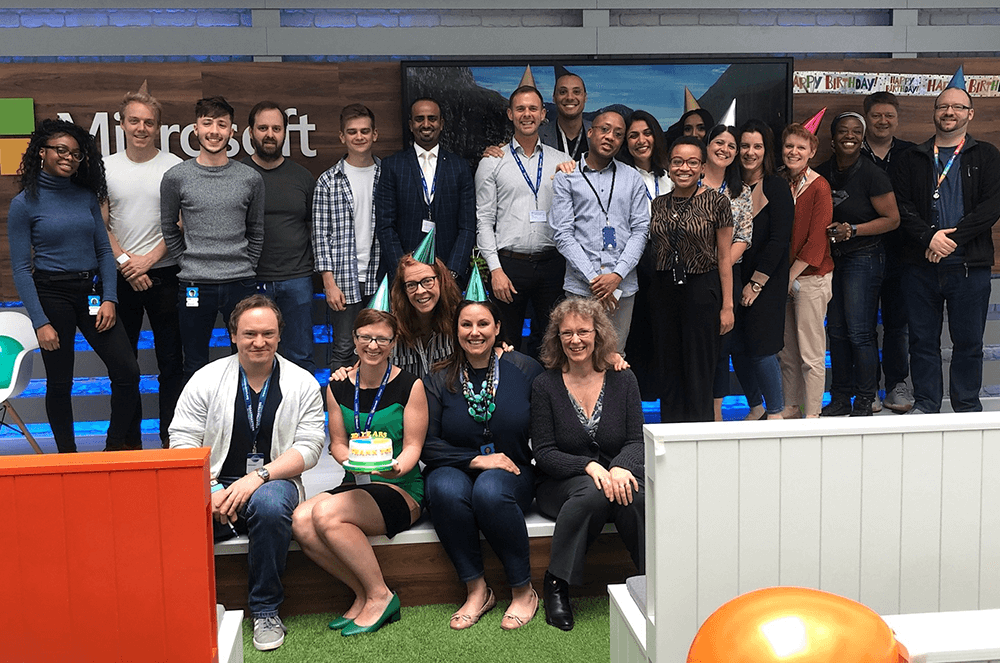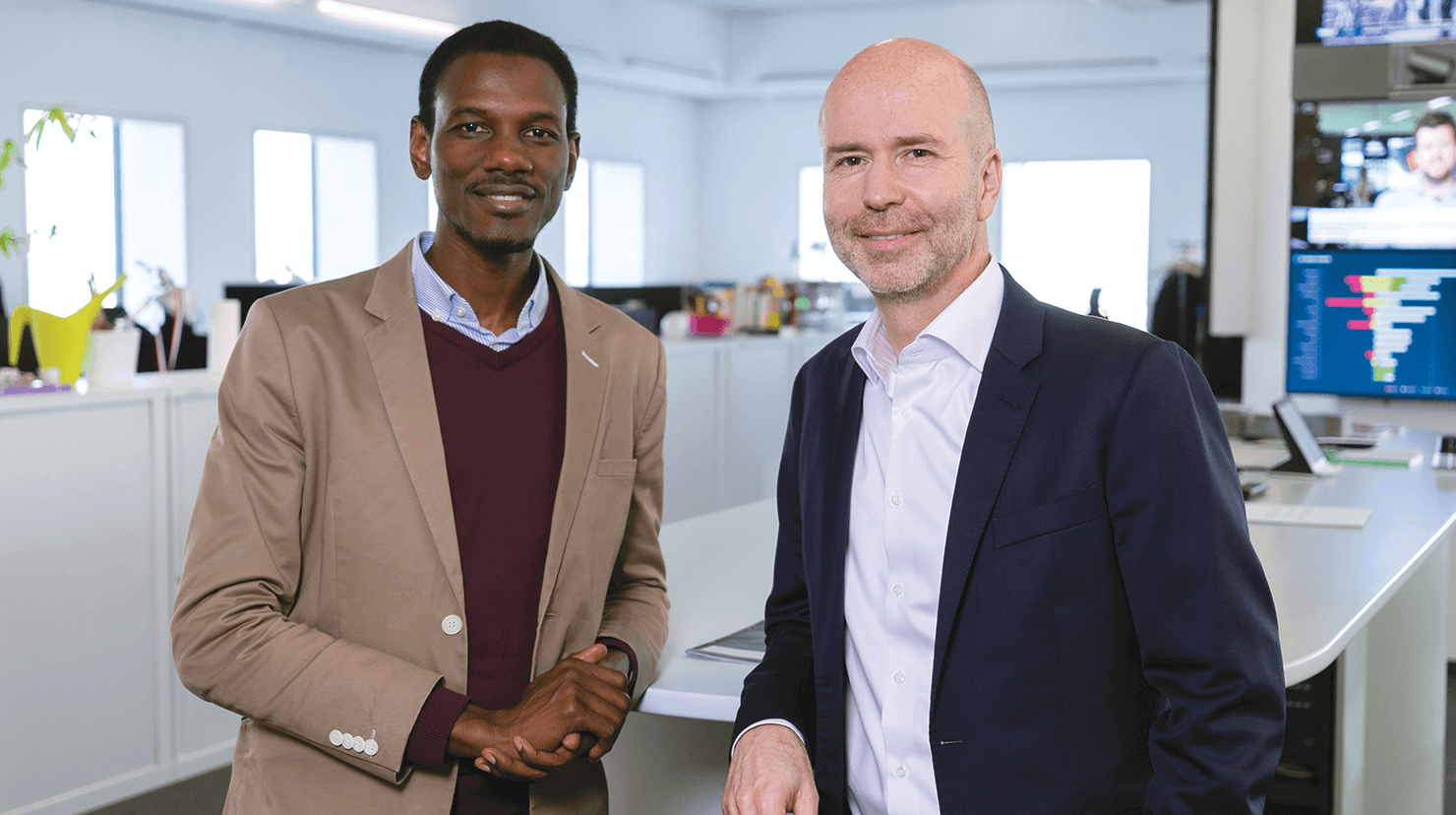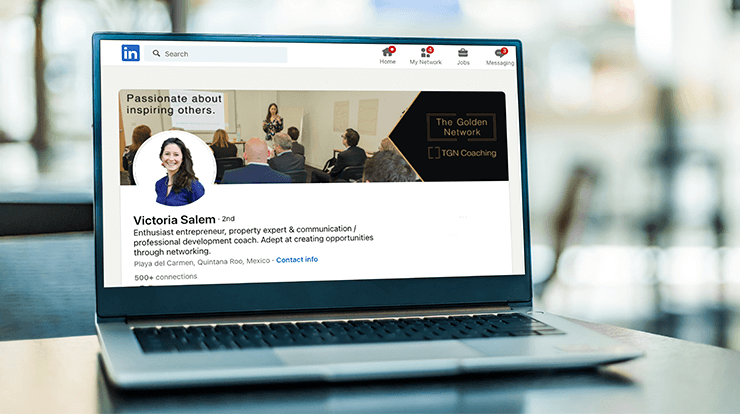 Microsoft Speakers Club in Reading, England, celebrates its 10th anniversary in 2018.
Microsoft Speakers Club in Reading, England, celebrates its 10th anniversary in 2018.I can see it now, decades after the fact: There I was, seated at a conference table with my boss and the company’s top brass, terrified to open my mouth for fear of making a fool of myself. My throat was dry. My hands were shaking. My only desire was that no one would ask me a question.
If I’d only known about Toastmasters! Any of the 11 paths in the Pathways learning experience—especially Visionary Communication and Persuasive Influence—would have made it easier for me to participate that day. In addition to helping me speak in meetings, my Toastmasters training changed my entire job trajectory by enabling me to parlay the writing and teaching work I’d done for years into presentation and performance. In so doing, it literally changed my life.
It should come as no surprise that, like me, many club members cite employment advancement as the primary reason they join Toastmasters. After all, the skills that Toastmasters promotes are the hallmarks of a great worker in a vast array of fields. Anything that adds to employees’ professional skill sets can benefit the employer as well, whether they are in leadership roles, speak on behalf of the company, make internal presentations, or simply need to collaborate effectively with others.
“Toastmasters gives its members a definite edge,” says Angelika Kofler, a certified life coach in Vienna, Austria. “It builds a string of small and big successes for the individual that enhances confidence and competence in any endeavor, both personal and professional.” That’s why so many companies welcome in-house corporate clubs, which typically meet within the business setting. This is as opposed to community clubs, whose members come from a vast array of backgrounds and meet at schools, community centers, restaurants, etc.
The Networking Advantage
Any Toastmaster knows that whatever the setting, a club meeting is a great place to meet others. Hannah Pratt, Immediate Past President of RE/MAX, LLC Toastmasters in Denver, Colorado, says that through her corporate club, she’s become acquainted with many people in different departments of her organization whom she otherwise likely would never have known. After all, it can be tricky walking up to someone in a large corporation and introducing yourself out of the blue, especially if that person is on a different management level.
“The club helps build camaraderie in the culture of the organization and in their teams. It also provides opportunity for cross-departmental learning, as well as accountability and mentorship.” Not only does Toastmasters give workers the chance to get to know more people at work, it also gives them the ability to shine when they do. Members are able to get to know coworkers on a more personal level, and see how they grow and interact with others in the club setting.
A non-corporate club, on the other hand, provides slightly different opportunities to network. By demonstrating your skills and your product or service at a meeting, you can more easily attract prospective clients and colleagues. You can even get a leg up on your job hunt. And speaking of job-hunting, don’t forget to list Toastmasters on your resume, perhaps under Volunteer Positions, Leadership, or Affiliations.
The Development of Practical Skills
Think about it. A club meeting provides a safe space to speak up, try new ideas, and feel comfortable with creativity and experimentation—as well as to experience the occasional failure and live to tell the tale. Many workplaces just don’t offer that kind of opportunity. And because of the built-in evaluation process, as well as the generous spirit of teamwork and learning that permeates the club, your audience is comprised of supportive, knowledgeable coaches.
The most useful benefit that club meetings have provided for Victor Valks, a member of TOPS—Toastmasters of Pinnacol Assurance in Denver, is confidence.
“My confidence relates both to the mechanics of speaking and to the intangible self-esteem improvements that happen as a result,” says the quality assurance analyst. “Learning to monitor and mitigate my ‘ums’ and other filler words has helped me relax while speaking.” What’s more, the encouragement of his fellow club members has allowed Valks to feel good about opening up and making himself vulnerable in front of others.
The club has also enabled his fellow club members to excel at specific work assignments.
Valks says, “Past President Rod Cole was a panelist on our company’s Black History Month roundtable discussion and practiced during a club meeting. And [2020-2021] Vice President Education Jordyn Cagney utilized a meeting to rehearse her discussion of the company’s return-to-work program.
“The skills I learned in Toastmasters are highly desirable when recruiting new employees and promoting current employees into leadership roles.”
–Rebecca Abraham“In my case,” Valks says, “I’ve been able to apply Toastmasters’ lessons while serving as a mentor in the company’s apprenticeship program for high school students. In addition, [Toastmasters] helped me to mitigate conflict, addressing and discussing differences of opinion before they escalate too severely. For example, when a colleague and I, whose job roles intersected, each thought that a particular task was ours to address, we discussed the matter openly, before it could fester and cause hurt feelings for us both.”
 Microsoft Speakers charter club member Christine Clacey delivers a speech during a club meeting at the Microsoft office in Reading, England.
Microsoft Speakers charter club member Christine Clacey delivers a speech during a club meeting at the Microsoft office in Reading, England.In Valks’ club, the speaking opportunities are ample, and Toastmasters helps members prepare for them. Other clubs actually create speaking engagements in the workplace. For example, marketing manager Angela Bos is Immediate Past Club President of the Microsoft Speakers Club in Reading, England. Over the last 18 months, Bos, who works with Microsoft’s marketing events team, has created a company speakers bureau that provides a pool of speakers to call upon for presentations at internal and third-party events.
Of course, the club has also benefited Bos herself. She says, “As a frequent public speaker for my previous position as a technical specialist, I joined Toastmasters specifically to improve my speaking skills. Over time, I found that the club also helped me develop my active listening, impromptu speaking, and leadership skills. The preparation, practice, accountability, and feedback involved in delivering Pathways speeches has helped me add greater clarity and conciseness to my presentations, abilities that became increasingly valuable as I began presenting to more senior audiences.” Bos still puts her speaking skills to use to encourage female participation in careers in technology.
Meanwhile, Toastmasters helped Pratt from RE/MAX fulfill her employment wish list. Although she always knew she wanted to work in communications and public speaking, she had no idea that she could do that full time. Thanks to the skills she learned at club meetings, she’s become an instructor within the company.
Human resources director Rebecca Abraham at Aristotle Capital Management in Los Angeles, is a big fan of Toastmasters, having been active in Beach Cities Toastmasters in Southern California.
“The skills I learned in Toastmasters are highly desirable when recruiting new employees and promoting current employees into leadership roles,” she says. “The ability to convey information articulately and persuasively is critical and is only becoming more important in our increasingly knowledge-based economy. Seeing Toastmasters on a candidate’s resume would definitely get my attention as a hiring manager.”
Networking. Resume-building. Self-improvement. Mentorship. And much, much more. With all these benefits, why would any employee not join Toastmasters?
As for me, I’m just grateful that I finally did.
Are you a member of a corporate club? Tell us how you have benefited. Use #talkingtoastmasters and join the conversation online or email magazine@toastmasters.org!
Caren S Neile, PhD teaches storytelling studies at Florida Atlantic University and has presented at three Toastmasters International conventions. Visit her at carenneile.com.
Related Articles

Club Experience
In Good Company

Club Experience
Common Challenges of Corporate Clubs

Personal Growth




 Previous Article
Previous Article
